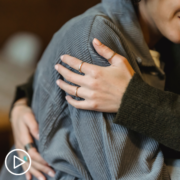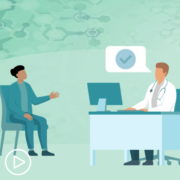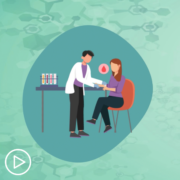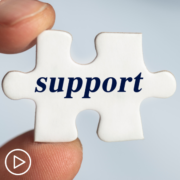CAR T-Cell Therapy | How Can Care Partners Provide Support?
CAR T-Cell Therapy | How Can Care Partners Provide Support? from Patient Empowerment Network on Vimeo.
Care partners are essential members of the CAR T-cell therapy team. Expert Dr. Shambavi Richard explains some specific ways that care partners can support their loved ones during the treatment and recovery processes.
Dr. Shambavi Richard is Co-Lead Physician for the Myeloma CAR-T Programs at Mount Sinai Tisch Cancer Center. Learn more about Dr. Richard.
See More from The Care Partner Toolkit: CAR T-Cell Therapy
Related Resources:

|

|

|
Transcript:
Katherine:
You mentioned the role of the care partner, and you’ve talked about the recovery process and how involved it is. What do you feel is the care partner’s role in helping a patient through the process?
Dr. Richard:
I think much of it is emotional and psychological support. I think that is very, very key. But in terms of actually what they do, we do ask that they have a caretaker available 24/7 if possible at least for the first month or so following their CAR T. And this is because they need a lot of support going back and forth from wherever they’re residing whether it’s a hotel or whether it’s their own home because there are a lot of clinic visits during that time.
We do ask that the patients don’t drive for at least the first month, maybe even the first couple of months following the CAR T because again they can have neurological side effects that may be somewhat subtle. Their judgement may be impaired, but they may not look that different. So, a caretaker who knows them well is very useful in saying, “There’s something weird about how Joe’s acting lately,” or something like that. So, that’s very important as well to bring them back and forth and to manage all of these. And if there’s a problem in the middle of the night, if they’re having new fevers, they’re suddenly neurologically altered, they do need a person to be able to handle things and bring them in and get the adequate medical support.
Katherine:
What questions should care partners be asking if they begin the process?
Dr. Richard:
I think a good understanding of all of those.
So, whatever that takes for each individual person. We have patients of various different kinds who have come to us, some who have researched it and really know what’s going on out there, and others who are comparatively, “What is this CAR T thing? We have no idea what this is all about.” So, I meet each one where they are. I go over the entire process. I touch on all the different things that we just spoke about. I talk about the logistics of it. I talk about the timing.
One of the traffic jams is being able to get that initial fresis slot to be able to even send the cells to the manufacturing. So, there’s a question of managing the resources and making sure that patients are getting to their CAR T slots in a timely manner. So, a good part of it is an understanding that all of this is not something that happens overnight. There is several moving parts. There is a way, and their system, and a way that all of these have to be aligned.
So, I pretty much answer whatever they have, but I think questions touching on all of this. And finally, they exact thing that you asked, “How is it that they can help? What are the things that they can do to help?” And I think that is hugely important as well.
Katherine:
Yeah. Why is it so important that care partners let the care team know about any changes in the patient?
Dr. Richard:
I think the earlier we know of changes, the better. We can handle these things. There is a time sensitivity to a lot of this. If issues that happen are not addressed right away, they can evolve to more severe condition. And once if they’re more severe, they’re less likely to respond right away to the therapeutic maneuvers that we have. So, I think that’s really important.
And if they’re outpatient, we do bring them in for hospitalization right away. If there is anything that is – the delayed forms of these side effects can sometimes be also a little bit harder to resolve and turn around. So, it’s important that they come back to the hospital right away, get admitted for the workup, so that we can escalate the speed at which things can be done.
Katherine:
Being a care partner can be overwhelming at times. Do you have any advice to help care partners as they cope with their role?
Dr. Richard:
There’s a lot of support groups. I really encourage them to start talking to a social worker right away. So, our social workers really do get engaged in the process pretty early. There are many different kinds of support groups. There are support groups that are myeloma specific, and then support groups within those that are offshoots for CAR T patients, so people either thinking of going through a CAR T or in the middle of it or even post CAR T.
All the anxiety of the monitoring and, “Is the disease going to come back?” And that can weigh heavily on the caretaker as well. So, an emotionally supported caretaker and patient just makes it a lot easier for everybody including the medical care teams to be able to handle all of this.










